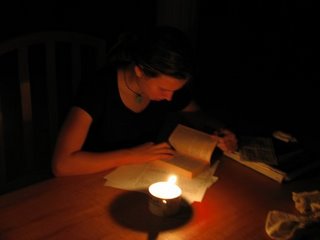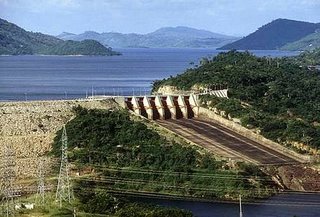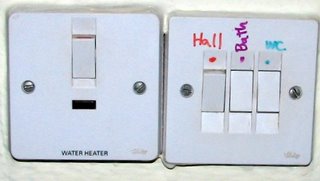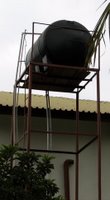What I've learned from Load Shedding
 It rained last night, something we had expected it to do a lot more since we arrived during the “rainy season”. But it has been drier than usual, and this is a problem. You see Ghana generates most of its power on the Akosombo Dam, on the lower Volta river. At the top of the Daily Graphic, the newspaper of Ghana, it lists the maximum water level at 278 ft, and the minimum: 240 ft. The problem is the Current Level: 236 ft, or 4 feet low. Below the headline reads “Conserve electricity & save the Akosombo Dam.”
It rained last night, something we had expected it to do a lot more since we arrived during the “rainy season”. But it has been drier than usual, and this is a problem. You see Ghana generates most of its power on the Akosombo Dam, on the lower Volta river. At the top of the Daily Graphic, the newspaper of Ghana, it lists the maximum water level at 278 ft, and the minimum: 240 ft. The problem is the Current Level: 236 ft, or 4 feet low. Below the headline reads “Conserve electricity & save the Akosombo Dam.” 
The solution, for the time being is something called “Load Shredding” where for period of time, “the light it off”. There is even a schedule for it printed in the paper and we are in block A. Every four days we lose power from the hours of 6am to 6pm or the reverse. It makes pretty interesting meal planning, for example on Friday, when we were scheduled to lose the light at 6pm, so at 5pm I pulled everything out of the Fridge that we could eat and we had “tad” dinner, a tad of this, a tad of that, and when we were done, nothing went back in.
In Ghana, one has the feeling that electricity is very precious, in the design or retrofit of the houses, conservation is planned. For example, there are no such thing as central air conditioning. Each room may have a unit controlled by a remote control. It is rare to see incandescent light bulbs here. Sure you see them for sale, but rarely in use. Compact fluorescents, or 20” florescent bulbs are the norm. Each power outlet has a switch on it, and the small water heaters also.


You wake up in the morning, turn it on, and when you are done, turn it off. The small units are fed by a solar water pre-heater, and combined with that and their size, they heat up quickly. Not surprisingly, the kitchen does not have an air conditioning. Kitchens generate heat, and so why waste power cooling it?
Even the appliances think differently: When the fridge door is opened, the compressor clicks off. A few days ago I came home and found the fridge door ajar, and thought of what a waste of energy, but I was wrong. Because the door was not closed, the compressor did not run, only the cool air was lost.
Still, we lose power every four days and as the rainy season ends, and the hope for a continual power source dries up, our thoughts turn toward a generator. In the larger homes of the more affluent areas of Accra, when the light is off, you can hear them chugging away. There are other options, what amounts to a whole house UPS (or Uninterruptible Power System) that will provide power to the fridge, lights and a few AC units for 6-8 hours, and recharge when the light is on.
These things and many others have helped me understand my folks better. Late in life they built a house in Cabo San Lucos, Mexico, where they had hopes to winter, and maybe live out their lives, much to the chagrin of their children. Though they did not ultimately live in that house for a variety of legal reasons, they continued to winter in Cabo, and we visited them once. I didn’t understand the attraction then, and am only beginning to now understand why people so dear to me would choose to live in such a far off and difficult place. Like here, the power would go off, it was hot, the drivers a little crazy, and food comes from the marketplace almost daily.
Life was hard for them, especially when compared to the states. But it was real, and I think that is what I am learning here, that a real life, is much preferred over a comfortable one. I wonder is sometimes if I have sacrificed a life with meaning for one of convenience. There is something about the inconvenience of life here, be it from the lights going off, or the lack of conveniences (that I thought were necessities) that has made me realize what these things are. Caleb Stegall in a CT review of David Goetz's book Death by Suburb writes: that the “ethos of suburbia is catering to ‘the overindulged self’ in an ‘environment of security, efficiency, and opportunities,’ all of which create a faux spirituality among Christians who live there. According to Goetz, their faith is really little more than busy avoidance of reality. The false image of the ‘good life’ offered by the suburbs creates what Goetz calls a ‘bloated, tiny soul.’” These words hit me especially hard because I know all this, and still lack the resolve to stand up the life of the privileged self, the life of instant gratification, the endless search for ease and comfort.
 I wonder if that is what my folks loved about Cabo, how alive they seemed there, and I am sorry I couldn’t see that then. I only saw how inconvenient or hard it seemed, when it really wasn’t. It was just real, and maybe that is what has been missing from my life, only I didn’t know it because it was filled up with so much comfort. Yet even as I write these words I feel guilty because relatively speaking, our lives are filled with comfort, and I wonder what more I have still yet to learn.
I wonder if that is what my folks loved about Cabo, how alive they seemed there, and I am sorry I couldn’t see that then. I only saw how inconvenient or hard it seemed, when it really wasn’t. It was just real, and maybe that is what has been missing from my life, only I didn’t know it because it was filled up with so much comfort. Yet even as I write these words I feel guilty because relatively speaking, our lives are filled with comfort, and I wonder what more I have still yet to learn.

1 Comments:
Hi Steve,
Such insightful, interesting essays!
Here's another spin on why Mom and Dad seemed so alive in Mexico: their connections were so much closer to other people.
You didn't call people up, you went to see them, perhaps spent some time with them. You didn't phone the restaurant for a reservation, you stopped by to make the reservation face-to-face.
In Cabo they had the time to relax and enjoy their friends, not rush about and work. Fewer distractions (TV, phones, newspapers, radios, etc. etc).
And with both of our parents being extraverts, they would come more alive from the closer connections to others.
Also, perhaps a bit of a return to how their childhoods were, in very small towns.
Thanks so much for doing these posts, they bring back a lot of memories for me.
Your sister,
Beth
Post a Comment
<< Home